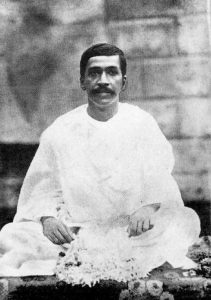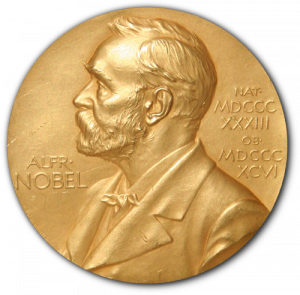 It is a relatively unknown fact that Sri Aurobindo was twice nominated for the Nobel Prize—first for Nobel in Literature in 1943 and second time for the Nobel Peace Prize in 1950.
It is a relatively unknown fact that Sri Aurobindo was twice nominated for the Nobel Prize—first for Nobel in Literature in 1943 and second time for the Nobel Peace Prize in 1950.
In 1950, the name of Sri Aurobindo was proposed for the award of Nobel Prize in Literature by Madame Gabriela Mistral, the Nobel Laureate of Chile and seconded by Miss Pearl S. Buck, the Nobel Laureate from America. A statement supporting Sri Aurobindo’s nomination was signed by 36 leading citizens and intellectuals of India out of whom 16 held the post of either a Chancellor or a Vice-Chancellor of one of the reputed Universities in India. The nomination letter reads as under:
———————————————————

Nobel Prize
The President
Svenska Akademien
Stockholm, Sweden 1949
Dear Sir,
Sri Aurobindo is held in deep reverence in India and other parts of the world. We, his countrymen and admirers, look up to him as one who shares the vision of the Great Ones of all ages and who belongs to the galaxy of ‘just men made perfect”. With his divine, cosmic vision and a life breathing forth the fragrance of holiness, Sri Aurobindo has given us a glimpse unparalleled for its profundity and sublimity, of the occult significance of the Vedas, the Upanishads and the Bhagavad-Gita. Through his writings he has revealed to us once again the pathway of experiencing the Real and the Eternal. This pathway is the Integral Yoga, the simultaneous divinization of consciousness and matter in various dimensions of the human personality. The story of the grand strategy of Evolution through which the Supreme Being fulfils Himself in the multifarious forms of manifestation constitutes the core of this universal drama of the Becoming. Poetry has become, in Aurobindo’s hands, an instrument for articulating the celestial music, the ecstasy of the Infinite and the whole system of Sri Aurobimdo’s thought is a superb edifice , a majestic summation of the Laws of the inner and the outer worlds in which the Eternal continues to exert pressure on all orders and aggregates of Life to ascend heavenward in an orchestration of a unified, cooperative movement, thus helping man to divest himself of the separative, egoistic, communalistic and nationalistic tendencies and to regain a living faith in the ideal of unity of all life.
Sri Aurobindo’s profound and penetrating analysis of the fundamentals of Indian Culture and his vision of India’s glorious destiny of being the meeting place of the best of the East and West have awakened us to the opulent spiritual heritage that belongs to us and the part that India has to play in the destiny of mankind. We look up to Sri Aurobindo as belonging to the family of the Seers and Sages of the world whose line has never ended and whose majesty of the soul will continue to shed luster on all parts of the world and at all times.
It is, therefore, a source of great pleasure to us to bring to your attention his contribution and to commend to your favourable consideration the proposal to award the Nobel Prize for Literature to Sri Aurobindo.
Yours faithfully,
- Sri N. Gopalaswamy Ayyangar, Minister for Transport, Government of India
- Sri. N. V. Gadgil, Minister for Works, Housing and Power
- Sri Jairamdas Daulatram, Minister for Food and Agriculture.
- Dr. Shyamaprasad Mukherji, Minister for Industry and Supply
- K. C. Neogy, Minister for Commerce
- His Excellency Sri M. S. Aney, Governor of Bihar and Chancellor, Patna University.
- Dr. S. K. Sinha , Premier, Bihar Government
- His Excellency Sri Chandulal Trivedi, Governor of East Punjab and Chancellor, East Punjab University
- Sri Bhimasen Sachar, Premier, East Punjab Government
- His Excellency Sri Mangaldas Pakvasa, Governor of Central Provinces and Chancellor of Nagpur University
- Sri Harikrishna Mehtab, Premier, Orissa Government.
- Sri Govinda Vallabh Pant, Premier, United Provinces Government
- His Highness the Maharaja of Gwalior, Rajapramukh of Madhyabharat Union
- His Highness the Maharaja of Patiala, Rajapramukh of East Punjab Union
- His Highness the Maharaja of Rewa, Rajapramukh of Vindhya Pradesh Union
- Asthana, Vice-Chancellor, Agra University
- D.R. Bhattacharya, Vice-Chancellor, Allahabad University
- C.R.Reddy, Vice-Chancellor, Andhra University
- Manavala Ramanujam, Vice-Chancellor, Annamalai University
- P. Parija, Vice-Chancellor, Benares Hindu University
- P. N. Banerjee, Vice-Chancellor, Calcutta University
- Mahamahopadhyaya Dr. P. V. Kane, Vice-Chancellor, Bombay University
- Kasturiraj Chetty, Vice-Chancellor. Mysore University
- M. B. S. Neogy, former Vice-Chancellor, Nagpur University.
- Sri Ali Yar Jung, Vice-Chancellor, Osmania University
- Sri C. P. N. Singh, Vice-Chancellor, Patna University
- Sir Teja Singh, Vice-Chancellor, East Punjab University
- Sri C. N. Acharya, Vice-Chancellor, Utkal University
- Sri A. S. Bharatan, General Manager, Press Trust of India
- Sri James Cousins, Poet, Dramatist , Art Critic
- Sri Tushar Kanthi Ghosh, Editor, Amrita Bazar Patrika, Calcutta
- Acharya J. B. Kriplani, Ex-President, Indian National Congress
- Sri Clara Motwani, Principal, Buddhist Women’s College, Colombo
- K. Motwani, Visiting Professor to Far Eastern Universities
- Sri Jamshed Nusserwanjee, Former Mayor, Karachi Municipality
- D. N. Wadia, Geological Adviser, Government of India
M. N. Murty
—————————————————————————————
The following words of three Nobel Laureates tell us of their high regard of Sri Aurobindo:
“I felt the utterance of the ancient rishis spoke from him of that equanimity which gives the human soul its freedom of entrance into the all. I said to him, ‘You have the word and we are waiting to accept it from you. india will speak through your voice to the world, hearken to me … O Aurobindo, accept the salutations from Rabindranath.’”
RABINDRANATH TAGORE, NOBEL LAUREATE, INDIA
“[Sri] Aurobindo Ghose, the foremost of Indian thinkers, has realised the most complete synthesis achieved up to the present between the genius of the West and the East. … The last of the great rishis holds in his outstretched hands the bow of creative impulse.”
ROMAIN ROLLAND, NOBEL LAUREATE, FRANCE
“Sri Aurobindo, the master, the highest of mystics, happily presents the rare phenomenon, an exposition clear as a beautiful diamond, without the danger of confounding the layman. This is possible because Sri Aurobindo is a unique synthesis of a scholar, theologian and one who is enlightened…”
GABRIELA MISTRAL, NOBEL LAUREATE, CHILE